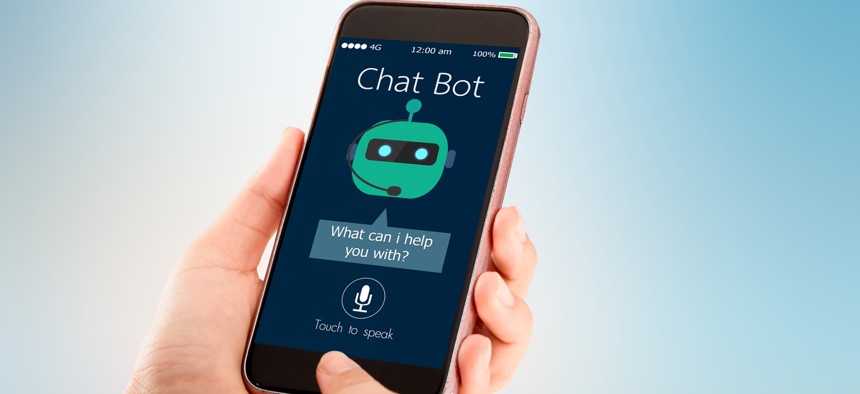We Want Chatbots to Sound More Human—But the Result Could Destroy Our Relationships

panuwat phimpha/Shutterstock.com
The internet is increasingly being populated by botified people
People have long fantasized about replicating themselves to save time and emotional energy. Relationships, after all, can be exhausting. There is only so much of you to go around.
In Ray Bradbury’s 1949 short story “Marionettes, Inc,” he imagines a future where we purchase realistic replicas of ourselves in order to dupe our spouses, utilizing the marionette to handle the annoyance and inefficiency of human-to-human communication.
“It may be splitting hairs, but I think it’s highly ethical,” says the story’s protagonist, Braling. “After all, what my wife wants most of all is ME. This marionette IS me to the hairiest detail. I’ve been home all evening.”
If Bradbury was writing in the 21st century, his life-like dolls would be chatbots. Similar to his marionettes, bots and other automated communication methods are essentially well-trained machines masquerading as humans. It’s duplicity cloaked as efficiency.
Welcome to the world of online communication, where you never know if you are talking with a real person.
Will the real you please speak up?
The internet is increasingly being populated by botified people—online marionettes—who are communicating as a facsimile of their real self, all in the name of productivity. For example, email newsletters allow people to extend their communication past what’s humanly possible for one-to-one dialogue. The reader understands that the “personal” email is one-to-many, but new automation tools will allow one-to-many communications to be presented as one-to-one. The reader will think they are receiving a message from the sender, but they are actually communicating with the sender’s marionette.
That’s not productive—that’s deception.
We try to scale intimacy because we’re trying to maintain too many relationships. Instead of culling the number of relationships online or being transparent about using automation tools to augment communication, people often send out their marionette and hope that nobody’s the wiser. People are automating significant portions of their communication—wishing people Happy Birthday on Facebook or asking to join someone’s professional network on LinkedIn— while presenting the conversation as real. It’s not.
Botified communication that cloaks itself as authentic is not a harmless form of efficiency—it is a selfish act that completely misunderstands the foundational qualities of relationships. In “Marionettes, Inc,” Braling fails to grasp that a replication of himself is not the same thing as himself. His marionette may have been able to offer the exact same words as he would to his wife, but that completely misses the value of forming a connection with her. Relationships are built on reciprocity of time and emotional energy, so to communicate through automation while hoping that the recipient views it as an authentic investment of time and energy is not the ultimate life hack—it is the ultimate hack job.
To err is human
Professional platforms such as LinkedIn and Twitter are also chock full of botified people sending their marionettes to do the dirty work of communication and building relationships. Here is my favorite example I have received recently, after I followed someone on Twitter:

The sender of this Twitter DM took the time to write out a lovely message to me, her new best digital friend, but they accidentally ended the message with a misspelled valediction (“Have a great dau!!”), which they followed with a quick typo correction.
Except it was no mistake. The message was automated.
The underlying person who the Twitter account is attached to is a real person, but I was sent his marionette to communicate with. This individual, just like the characters in Bradbury’s morality tale, wanted me to spend my finite resources, but was unwilling to offer the same to me. That’s not efficiency—that’s offensive.
After something felt fishy, I decided to test the authenticity of the message. I went onto a different Twitter account and followed this particular individual again. Sure enough, the exact same string of sentences, including “Have a great dau!!” followed by a correction, arrived as a DM.
The sender must have thought that he is some type of evil genius by programming an error to appear more human. But I just think people like this are manipulative. People want to use automated communication tools to scale their own intimacy, but they don’t want those same tools used on them. You can’t cut it both ways.
Real communication takes real work
In Bradbury’s tale, the motto for the company producing marionettes is “No Strings Attached.” There were plenty of strings attached, of course (and “Marionettes, Inc” doesn’t exactly have a happy ending). Each character in the story wants the benefit that a marionette provides, but they certainly don’t want to be transparent about the deception. Just as one person could buy a marionette to communicate with another human, the other human could also replace themselves with a marionette.
That’s exactly where online communication may be headed—a race to the botified, where the bots that are supposed to building relationships with other humans are merely just communicating with other bots. It would be endless, entirely pointless communication; an M.C. Escher drawing for email.
If people want to talk to an actual human, they should act like one.





